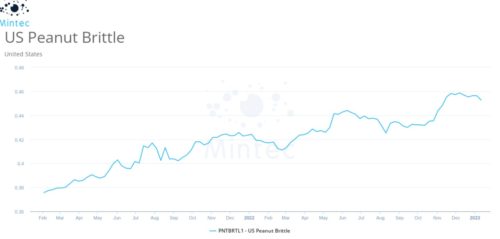Food-industry press release of the week: peanuts
I received an e-mailed press release from The Peanut Institute: Peanuts and Peanut Butter Support Women’s Health.
When it comes to health, women face unique challenges that call for unique nutrition. In fact, research has found that women face a higher risk of dying from heart disease than men,1 and may be at risk for other conditions such as hypertension,2 certain cancers,3 and even Alzheimer’s disease.4 To help women protect their health, The Peanut Institute is sharing information on the benefits that regular consumption of peanuts and peanut butter delivers to females at every stage of life.
Here are excerpts from those stages.
- Birth to 24 Months: A child’s first two years are referred to as “B24” and are a critical time in the growth and development of the brain and body. The most recent Dietary Guidelines for Americans highlights peanuts as “an important source of iron, zinc, protein, choline and long chain polyunsaturated fatty acids.”2
- For youngsters and teens: On the subject of protein, at 7 grams per ounce, peanuts have more protein than any other nut.6. That’s especially important for girls who work out since protein helps muscles grow, recover and stay healthy.7 Plus, peanuts are satisfying and an easy, on-the-go snack that can be stowed in a backpack, locker or car.
- For adults and seniors: The Journal of the American Heart Association found that following a plant-based diet with nuts, legumes, fruits and veggies can lower the risk of dying prematurely from multiple causes, including cardiovascular disease, one of the leading causes of death worldwide.8 In addition, phytosterols, like those found in peanuts, may inhibit the growth of cancers that affect millions of women, including lung, stomach, ovarian, colon and breast cancers.9-12
I did not look to see whether the references were funded by the peanut industry, but there is plenty of precedent. See, for example,
- Industry-funded study of the week: Peanuts
- Annals of industry-funded research: Peanuts this time
- Industry-funded request of the week: prove peanuts healthy
But there’s more. A reader, Monica Baer, sent me another press release from the Peanut Institute: New Gut Microbiome Research Points to Positive Impact on Memory and Mood from Peanut Consumption
Research from the University of Barcelona on the gut microbiota has found that daily consumption of peanuts and peanut butter can produce compounds in the gut that help improve memory and reduce stress response, including anxiety and depression, in healthy young adults. Findings from the ARISTOTLE study were published online in the Journal of Functional Foods this September and shared by The Peanut Institute.
I did look up this one: Isabella Parilli-Moser, Ricardo López-Solís, Inés Domínguez-López, Anna Vallverdú-Queralt, Sara Hurtado-Barroso, Rosa M Lamuela-Raventós, Consumption of peanut products enhances the production of microbial phenolic metabolites related with memory and stress response: Results from the ARISTOTLE trial, Journal of Functional Foods, Volume 108, 2023, 105746, https://doi.org/10.1016/j.jff.2023.105746.
Funding: This work was supported by funding from the Peanut Institute.
I like peanuts. They are legumes and real foods. But to attribute overall health and memory function to eating peanuts seems a bit far-fetched. That’s why the Peanut Institute is funding research: to convince you peanuts are a superfood. There is, of course, no such thing. Superfood is a marketing term. Should you eat peanuts? Sure. Why not?




